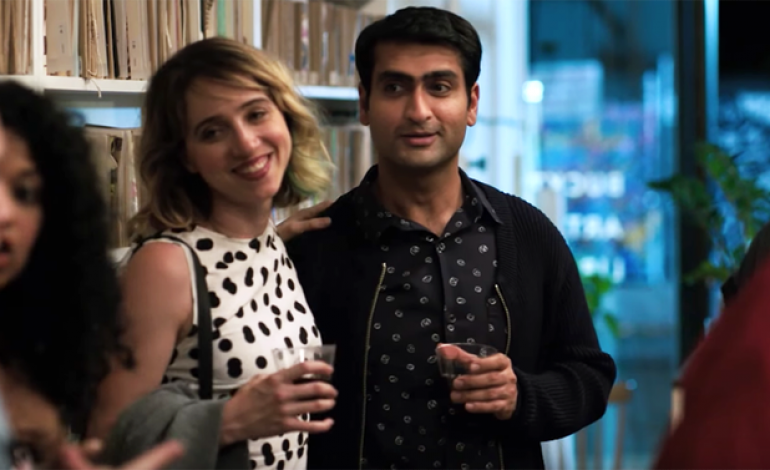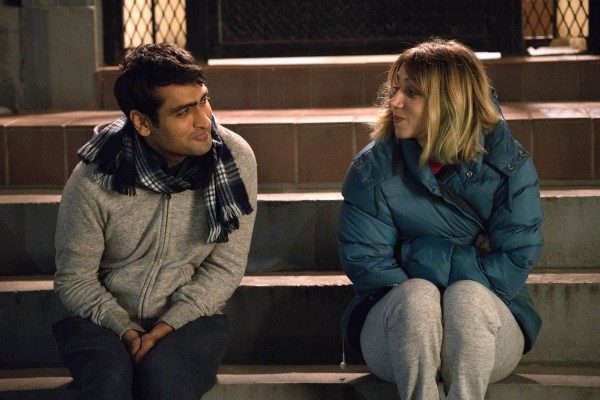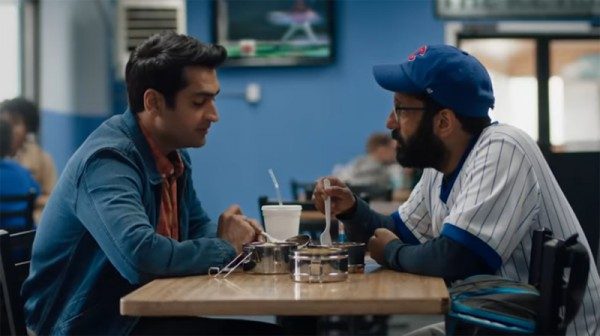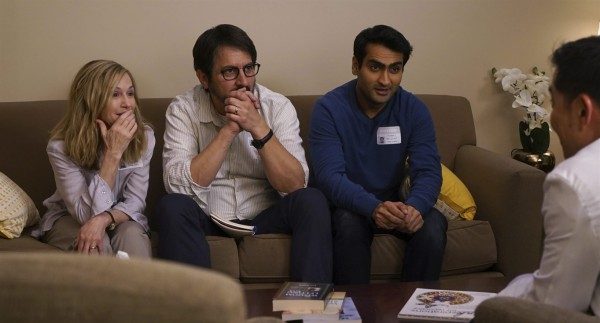

It looks as though audiences can officially add a brand new genre to their movie repertoire after seeing Michael Showalter’s The Big Sick — the Romantic Comedy Epic. Revolutionizing what we have come to expect from romantic comedies in the past — gorgeous white male and female leads, gooey and/or ridiculous plots, and storytelling standards that earn them the label of “chick flick” — Showalter, along with writers Kumail Nanjiani and Emily Gordon, have trounced convention while delivering a wholly comedic, heartbreaking, heartwarming, cross-generational, and cross-cultural movie experience. With executive producer Judd Apatow pulling strings behind the scenes, Nanjiani’s true life rom-com story does for unconventional romantic leads and minority representation what Trainwreck did for Amy Schumer and her off-brand, yet truer to reality, comedic leading woman.
To steal from Aziz Ansari, The Big Sick builds heftily upon what we have come to consider as “Modern Romance.” Following Pakistani-American Kumail (Nanjiani) as an aspiring professional stand-up comedian, the story sees the simultaneous development of his relationship with Emily (Zoe Kazan) — a girl he meets at a bar, takes back to his sad bachelor apartment, has sex with on his blow up mattress, and gives her a ride home as her Uber driver. Threatening to split them apart from the get-go are commitment issues, Kumail’s Pakistani parents vigorously working toward an arranged marriage for him, as well as some of Emily’s own hang-ups. After reaching somewhat of an impasse in their relationship, Emily is admitted into the Emergency Room for a mysterious infection and later put under a medically induced coma. All of these issues come to a head for Kumail as he deals with career pressures, Emily’s scared and initially hostile parents (Ray Romano, Holly Hunter), and his family continuing to set him up with eligible Pakistani women, completely unaware of Emily’s existence. Along for the ride are Kumail’s circle of Chicago comedians, including standout performances from Bo Burnham, SNL’s Aidy Bryant, and Kurt Braunohler (Bob’s Burgers).
The romance and the story feel real, which is due in large part because it is real. The love story is affected on all sides, by modern technology, familial pressure, subversive tradition, commitment phobias, and an interracial relationship in which culture and race actually play significant and not stereotypical roles. Nanjiani and Gordon manage effortlessly to balance life’s mundanity and magic to bring their story to life. In reference to the initial statement of the film being an “epic”, it importantly does not treat the romance as an isolated incident in their lives, but as an ongoing event affected by the countless outside forces of the everyday.
Emily’s parents, fearing for the life of their daughter, developing a relationship with her maybe ex-boyfriend, and dealing with their own personal relationship issues, have both an autonomous and intersecting storyline with Kumail and Emily. Likewise, Kumail’s brother Naveed (Adeel Akhtar), and parents Azmat (Anupam Kher) and Sharmeen (Zenobia Shroff) attempt to impart the cultural traditions of their Pakistani culture and Islamic faith onto their brother and son who has toes dipped into both the Pakistani and American pools. With Emily and Kumail’s families, the romantic comedy also turns into a story of melting pot America, a country of immigrants all striving to hold onto a semblance of tradition while capitalizing on the freedoms of the country and its youth as it grows closer and closer together through technology, shared experience, and romance. Family and culture play significant and decisive roles in the film, showing a refreshing dedication to the complete story, building fully realized characters from the factors of environment and heritage that make us tick, unite us, and if skirted around, divide us.
Even more refreshing is Showalter, Nanjiani, and Gordon’s rich and intentioned female characters. Emily, her mother Beth, Kumail’s mother Sharmeen, Bryant’s Mary, and even the women with whom Kumail is set up with by his parents (particularly Khadija played by Vella Lovell) are all given the floor to live, experience, and establish their unique voices and differing perspectives within the film. Each woman, in conjunction with each man, has her own complicated motivations that directly affect the shared and individualized plots. While Emily stands up for the legitimacy of her cultural perspective, Beth establishes herself in the role of the mother, the wife, and as a force polarized from these roles, and Sharmeen is a rock in keeping her son accountable and acting as the spiritual head of the family.
Also given a significant voice is Nanjiani as a shining example of Hollywood’s next breed of leading men — the uncategorized and unhemogenized. It’s almost laughable how effortlessly Nanjianji fills the role of the modern American bachelor and how films like this are currently an exception within the genre. Nanjiani went out and virtually crafted a role for himself and created the opportunity to bring his story to audiences. If anything is resoundingly clear, though, after seeing this film, it is that stories like this of clashing culture and messy relationships in the modern world fit the “American” label equally, if not more, than any other film claiming to do so.
Verdict: 5 out of 5
The Big Sick is simply an unmissable film. It ticks off every box of entertainment — comedy, romance, tragedy — while also being its very own animal. For a film that incorporates a large slew of intertwining stories, relationships, and genres, it never veers off of the central narrative. The stand-up comedy, also playing a significant part in the drama, is wildly entertaining, and is a perfect accompaniment to the gushier parts of the romance, and the heart-rending familial storylines. Nanjiani and Kazan are both solid and charming at the emotional center of the film’s numerous and outstanding supporting performances.



